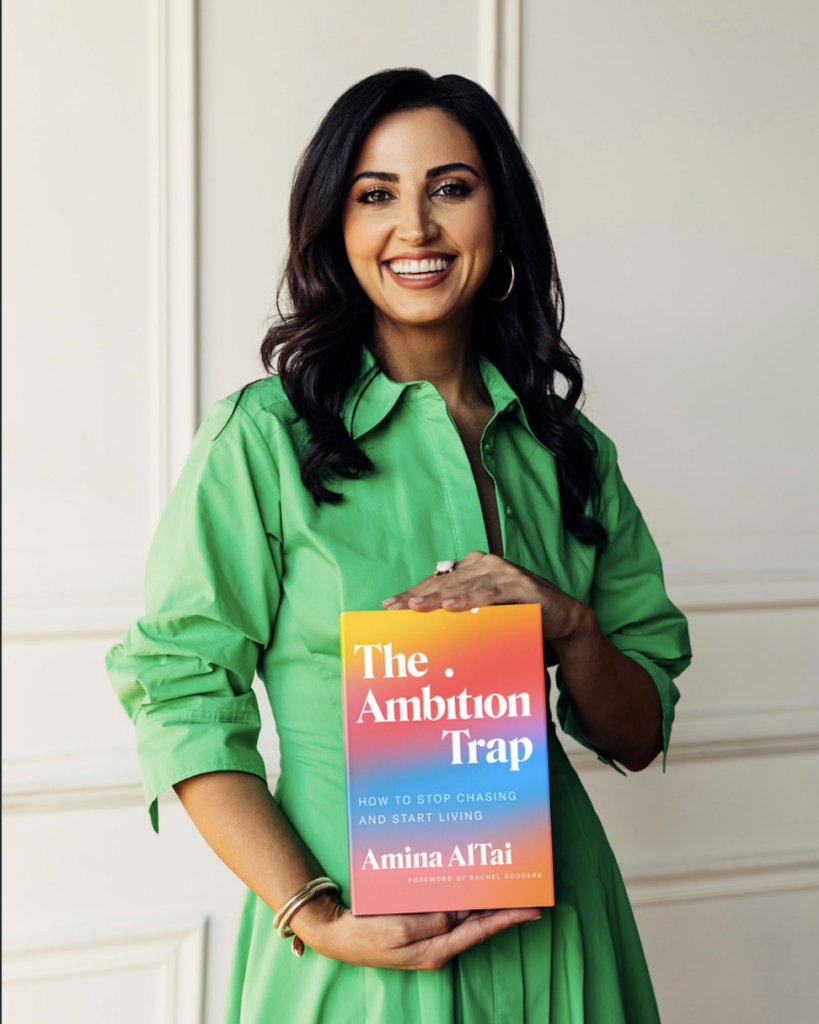Amina AlTai Wants Us To Reclaim Ambition — And Redefine What It Means To Succeed

Amina AlTai has made a career out of asking better questions — about identity, ambition, burnout, and the narratives that shape how we show up in our work. As a holistic business coach to Olympians, Fortune 100 leaders, and founders alike, Amina’s approach is not about hustle culture. It’s about healing.
“Ambition is a beautiful thing,” she said. “It’s not just for some of us. It’s for everyone.”
Amina, a woman of Iraqi descent and the daughter of immigrants, is on a mission to help historically excluded communities reclaim ambition on their own terms. Her upcoming book, The Ambition Trap, explores the intersections of identity and ambition, and the emotional toll of striving in systems not built with equity in mind.

The Power Of A ‘Stop Moment’
Amina’s own journey to this work is rooted in personal experience. After years of chasing success in brand management and co-founding a creative agency, she found herself burned out and battling two autoimmune diseases. A life-threatening health scare became her “stop moment” — a phrase she uses in both coaching and personal reflection.
“I had to choose: keep going the way I was, or find another way,” she said.
That decision led her to a year of intense self-exploration. She dove into life coaching, nutrition, mindfulness, and somatics — not with the goal of building a business, but to simply feel better.
As she healed, she realized she wanted to share what she had learned. Her coaching practice grew, and over time she began to work with companies like Google, NYU, Deloitte, and Snap. Today, she’s a Forbes contributor, Entrepreneur Magazine expert-in-residence, and one of Success Magazine’s Women of Influence.
“We write the book we need most,” she said.
Making Ambition ‘Right’ For Everyone
At its core, Amina’s philosophy is that ambition is not inherently toxic — but the way it’s shaped by culture and identity often is.
“We make ambition right for some people and wrong for others,” she explains. “Ambitious men are seen as strong and powerful. Ambitious women are ‘too much.’ Add in race, ability, or sexual orientation, and it becomes even more complicated.”
In her coaching, she calls this “the ambition trap” — the belief that we are simultaneously too much and not enough. The result is often burnout, imposter syndrome, and the internalization of systemic oppression.
Through this lens, Amina offers a reframe of ambition.
“What if ambition is simply a desire for growth — a desire for more life?” she said. “That’s something every living being has. It’s natural. It’s neutral. The trap is believing it isn’t for you.”
How To Embrace ‘Purposeful Ambition’
Through her book, Amina introduces the concept of “purposeful ambition” as an alternative to the toxic individualism of “painful ambition.” To her, purposeful ambition is collaborative, community-driven, and rooted in the idea that we can take care of ourselves and others at the same time. It’s ambition as a force for cultural change, she said.
“We’re taught to elbow each other out of the way, like there’s only space for one of us,” she said. “But that’s just a scarcity mindset rooted in fear. There is enough space for all of us.”
Amina said many of her clients feel conflicted about wanting more in a world that hasn’t always welcomed their voices.

Embracing A ‘Mind, Body, Business’ Approach
Amina’s approach — what she calls “mind, body, and business” — centers the body as much as the business plan. She encourages clients to design their work weeks around their energy levels and lived experience, especially those managing chronic illnesses or caregiving responsibilities.
“We’re not just heads walking around disconnected from our bodies,” she said. “We have to build lives that honor how we feel.”
That lesson has been personal for her, too. Living with autoimmune disease, she said she has learned to pace herself and practice nervous system regulation. Even while promoting her book, she carves out time for rest and recovery, reminding herself that ambition doesn’t mean more for more’s sake.
Her vision for the future of leadership is one of wholeness and collaboration, where ambition is inclusive and expansive — not something we weaponize or gatekeep.
“I want to invite people into purposeful ambition,” she said. “Ambition that feels good, that drives change, that lifts people up. I want people to know that ambition isn’t scary. It’s not something to fear. It’s something to reclaim.”






